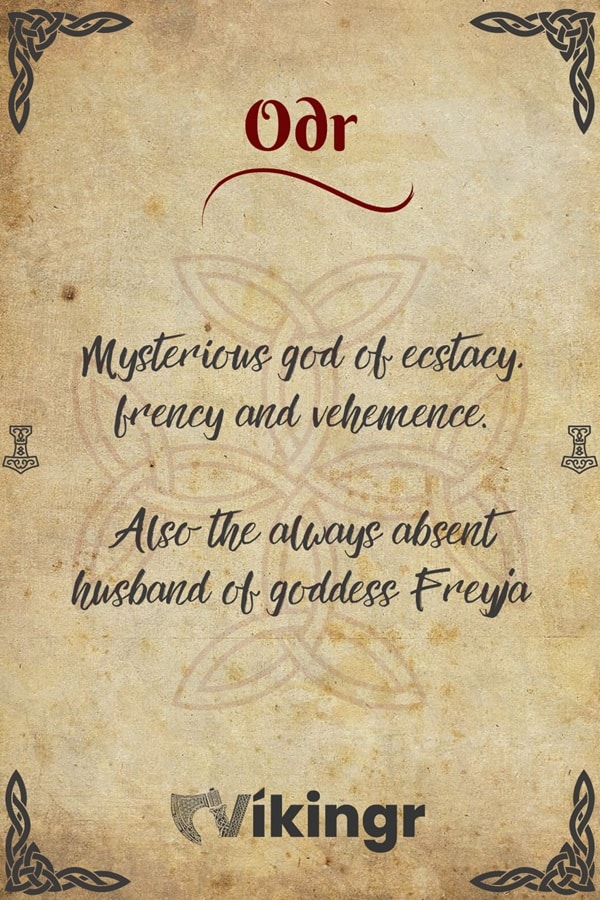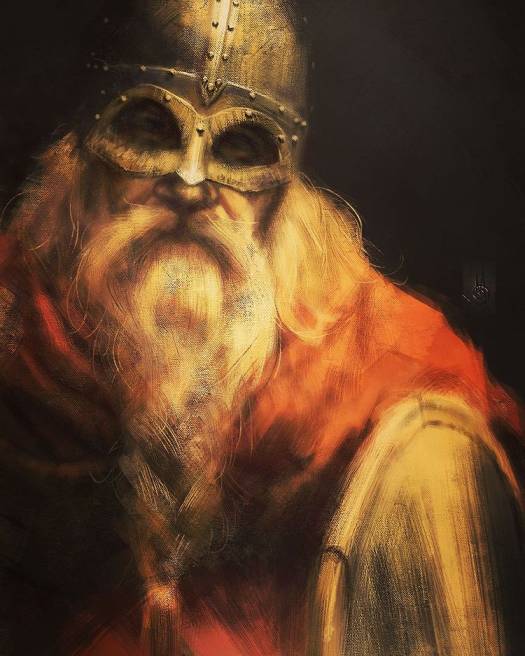Many of the renowned gods and figures from Norse mythology have deeply embedded themselves in popular culture, but then there are gods like Odr. Often overlooked but equally intriguing, Odr plays a pivotal role in the Norse pantheon, particularly due to his relationship with Freyja, his wife. A dive into his story provides insights not only about the god himself but also about the intricate fabric of Norse mythos.
Short Facts
| Parents | Unknown |
| Partners | Freyja |
| Siblings | Unknown |
| Offspring | Hnoss and Gersemi |
| Tribe | Aesir |
| Old Norse name | Óðr |
| Other names | Óður, Od |
| The God of | Possibly passion or frenzy |
Name and Etymology
Odr’s name in Old Norse, “Óðr”, holds profound significance and can be translated as “Divine Madness, frantic, furious, vehement, eager.” This translation gives a clearer insight into the nature of the god, as someone who embodies the essence of passion and fervor. The term “Óðr” stems from the Proto-Germanic word wōðaz, which can be described as ‘possessed, inspired, delirious, raging’ — a characterization that is vivid and intense.
The connection between Odr and another major figure in Norse mythology, Odin (Old Norse Óðinn), is a topic of debate. Philologist Jan de Vries suggest a probable original connection between the two deities. According to de Vries, Óðr (*wōđaz) might be the elder form and the foundational source of the name Óðinn (*wōđa-naz). If this assertion holds, it implies an intricate intertwining of these two entities in the annals of Norse myths, suggesting Odr’s potential ancient prominence.

Kennings Related to Óðr
Kennings are poetic circumlocutions used in Norse and Old English poetry. In relation to Odr, there aren’t direct kennings that depict him, but his significant relation to Freyja gives rise to some notable mentions. When periphrasing or referring to Freyja in poetic terms, she can be called the “Wife of Ódr.” This shows Odr’s prominence as being integral to Freyja’s identity in poetic expression.
Another kenning that underscores the depth of their bond, especially emphasizing Freyja’s sorrow over Odr’s absence, is found in the poetic depiction of gold. Gold, referred to as the ‘Eye-rain of Óðr’s Bed-Mate’, is a poignant reference to the tears of gold Freyja sheds, symbolizing her longing and love for Odr. This beautifully encapsulates their profound relationship, as even treasures like gold are contextualized within the framework of their passionate love story.

A mysterious god
Odr is the god of vehemence, longing and passion. He is also associated with desire and rage. His name means ‘the frenzied one’ in Old Norse. Some scholars suggest that Odr is another name for Odin owing to the fact of the same elusiveness of both. The only information about Odr is that he’s Freyja’s husband and father of her beautiful daughters; Gersemi and Hnoss.
For reasons unknown, Odr didn’t stay long with Freyja and went away from her and the other gods of Asgard. He journeyed far and wide, ultimately isolating himself from gods and mortals alike.
Freyja, the most beautiful and the most desired goddess, couldn’t stand his absence. She loved him so much she wept tears of red gold and tried in vain to find him.
A betrayed god
It is strongly implied that Freyja drove Odr away from her side. When the goddess of beauty was obsessed with gold she searched the Nine Realms for that one special present. She met four dwarves, who offered her the magnificent necklace Brisingamen if she spent one night with each of them. Freyja accepted, being certain that no one would ever know, but she was unaware of Loki watching her. Odin Allfather heard of Freyja’s dishonorable act and punished her. But, it was Odr’s departure that hurt her the most.
Right after Freyja’s betrayal, Odr, feeling disgusted by all the gods, decided to leave and never to return. Some theories propose that he traveled the Nine Realms to teach mortals the meaning of desire, love, pain and passion. To grant wishes to those in need, and help wanderers to reach their destinations. Others say that Odr returned to his beloved wife, Freyja – eventually forgiving her – and never again left her side. Whatever happened will always remain a mystery as the one surrounding Odr’s background story.
Play Fun Norse Quiz
Is this article making you even more curious about Norse gods and goddesses? You can satisfy your curiosity by playing a fun Norse mythology quiz. This way, you can test your knowledge about Norse gods and goddesses, as well as fill in some gaps. Good luck and have fun playing!
Don’t forget to try our other games as well!
Mentions in Ancient Texts
Prose Edda
The Prose Edda was written by the Icelandic historian, politician, and poet Snorri Sturluson in the 13th century. It serves as one of the primary sources of Norse mythology and historical tales. Odr’s presence in this compilation is undeniable, as he plays an important role, especially in relation to Freyja.
Gylfaginning
In the “Gylfaginning” section of the Prose Edda, Odr is most notably mentioned in relation to his wife, Freyja. Their love story and the subsequent sorrow of Freyja upon Odr’s mysterious disappearance are central themes. A quote from this source reads:
“Freyja has many names, and the reason for this is that she changed her name among the various nations to which she traveled in search of Óðr.”
This emphasizes her unyielding quest to find her beloved Odr, further solidifying the depth of their bond in the narrative.
Poetic Edda
The Poetic Edda is a collection of Old Norse poems originating from medieval manuscripts. Unlike the Prose Edda, which is more systematic, the Poetic Edda captures the raw emotions, stories, and themes of Norse mythology. The collection also sheds light on Odr’s significance.
Völuspá
In the “Völuspá”, often known as the “Prophecy of the Seeress”, Odr isn’t directly mentioned but the references to Freyja and her golden tears offer indirect insight into their story. The intensity of their love and Freyja’s lament for Odr is a recurring theme. A poetic excerpt captures this sentiment:
“Golden tears she cries; the bright goddess weeps for her lost love.”
This line encapsulates the profound sorrow and longing of Freyja, reminding the reader of Odr’s centrality in her lore.
Hyndluljóð
In “Hyndluljóð” or “The Lay of Hyndla”, Freyja’s search for information about her family lineage, with Odr’s influence and relevance, comes to the forefront. Though a direct quote highlighting Odr isn’t present, the poem, on the whole, provides context about their relationship and their offspring, showcasing the importance of their lineage in Norse cosmology.
These mentions, whether direct or indirect, provide valuable glimpses into Odr’s significance and his deep-rooted influence in Norse mythology.
FAQs
There is not much information regarding Odr. The only known fact is that he is Freyja’s husband and that he is always away. One can only trade with assumptions and hypotheses as to Odr’s real story.
Many scholars argue that Odr and Odin are the same. They mention the many similarities these two deities share. However, the old texts say that Odr is Freyja’s husband. They don’t mention him as Odin, but as Odr.
Loki, the trickster, was known for his harmful acts. He followed Freyja into that dwarven cave and saw what she did in order to get the Brisingamen necklace. He went straight to Odin and spilled the beans on Freyja. Whether Odr is Odin or Odr is a sole deity Loki revealed Freyja’s secret just for the fun of it.

Hi,
In Icelandic (which resembles Old Norse), Óðr would be pronounced something like Othr. To my ear this sounds a lot like Arthur. I wonder if the English Camelot legend has Norse origins.
So now we know where Óðr was when not with Freyja – in England with Guinevere!
Takk for your web site,
Gary
Thanks Gary, appreciate your great feedback. Interesting observation you make. I for sure believe that it’s more likely to have been a separate entity named Óðr (at some point in time), than him just being another name for Odin. That he might have been the inspiration for other tales might very well be. I’d of course be happy to claim the legend of Arthur for the vikings 😉
Br,
Marius